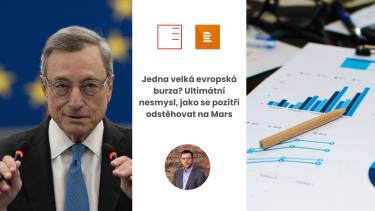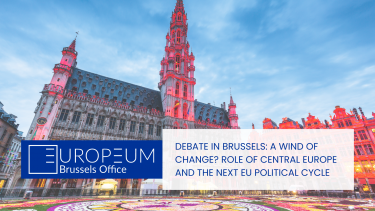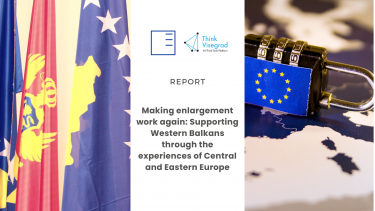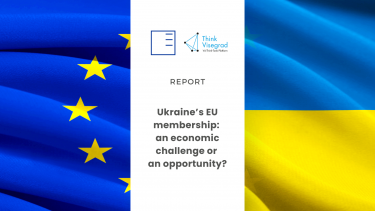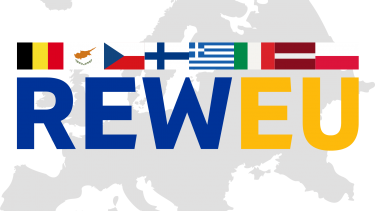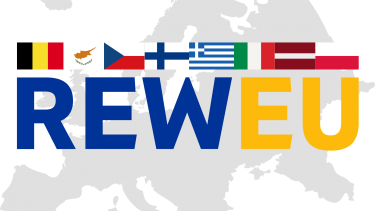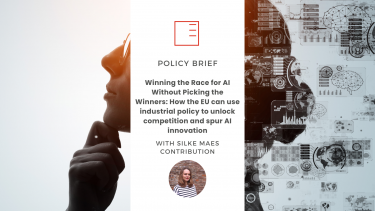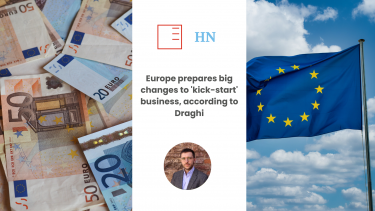ČRo Plus | One big European stock exchange? The ultimate nonsense, like moving to Mars the day after tomorrow
The European Union is struggling with economic problems and is increasingly looking at the back of the US and in some respects China. According to a report recently commissioned by the European Commission from the former central banker and former Italian Prime Minister Mario Draghi, the solution lies, among other things, in greater European investment. And to ensure that there is enough money for this and that European investors do not go elsewhere, the European capital market should be strengthened. Filip Křenek, project coordinator and analyst at EUROPEUM Institute, commented for Český rozhlas Plus.
Show more
ČRo Plus | Jedna velká evropská burza? Ultimátní nesmysl, jako se pozítří odstěhovat na Mars
Evropská unie se potýká s ekonomickými problémy a stále více se tak dívá USA a v některých ohledech i Číně na záda. Podle zprávy, kterou si nedávno objednala Evropská komise u bývalého centrálního bankéře a italského expremiéra Maria Draghiho, jsou řešením mimo jiné větší evropské investice. A aby na ně bylo dost peněz a evropští investoři nechodili na trhy jinam, měl by se posílit evropský kapitálový trh. Pro Český rozhlas Plus komentoval projektový koordinátor a analytik Institutu EUROPEUM Filip Křenek.
Show more
Debate in Brussels | A wind of change? Role of Central Europe and the next EU political cycle
As the dust settles after a hectic period of post-election negotiations, Von der Leyen’s second Commission is faced with serious economic challenges. Recent reports of Draghi and Letta have clearly indicated that the EU is lagging behind other global powers in the areas of growth and competitiveness and this is reflected in the composition of the College as well as within strategic priorities for the next political cycle. Come listen and debate about challenges EU is facing!
Show more
Report | Making enlargement work again: Supporting Western Balkans through the experiences of Central and Eastern Europe
On September 12th, EUROPEUM’s Brussels Office organized a public conference titled “Making enlargement work again: Supporting Western Balkans through the experiences of Central and Eastern Europe”. Following a keynote speech by H.E. Bálint Ódor, the panel discussions dwelled on the 2004 enlargement, its impacts on the EU and the lessons learned from the process through the perspective of current EU accession of the countries of Western Balkans.
Show more
Report | Ukraine’s EU membership: an economic challenge or an opportunity?
On September 26th, EUROPEUM’s Brussels Office organized an expert discussion titled “Ukraine’s EU membership: an economic challenge or an opportunity?” The debate focused on the potential economic impacts of Ukraine’s accession to the Union, including the EU budget, sectoral policies, energy or critical raw materials. It also evaluated the opportunities for Central European countries and their private sector to strengthen the ties between the two regions. Read the full report below.
Show more
REWEU
The project (Re)uniting the East and West: Reflections on the 2004 EU enlargement (REWEU) is focused on the commemoration of the 2004 “big bang” EU enlargement at the occasion of its 20th anniversary in May 2024. This event had numerous positive effects on shaping Europe as we know it today, boosting its security, economic potential, and spreading democracy, good governance and European values across the European continent.
Show moreREWEU
Projekt (Re)uniting the East and West: Reflections on the 2004 EU enlargement (REWEU) je zaměřen na připomenutí „velkého rozšíření“ EU v roce 2004 u příležitosti jeho 20. výročí v květnu 2024. Tato událost měla řadu pozitivních dopadů na utváření Evropy jak ji známe dnes, posílila její bezpečnost, hospodářský potenciál a rozšířila demokracii, princip řádné správy a evropské hodnoty po celém evropském kontinentu.
Show morePolicy Brief | Winning the Race for AI Without Picking the Winners
Boosting European productivity and competitiveness hinges on both the development and uptake of technology, especially AI. Europe has a chance to place itself centrally in the AI value chain if the EU and its member states ensure access to computing power, data and finance as well as improving citizens’ basic and advanced digital skills. Research Fellow at EUROPEUM Institute Silke Maes, among other contributors, writes in this Policy Brief.
Show moreTAPF | Transatlantic Evening Talks
Don’t miss this unique opportunity to expand your understanding of transatlantic relations with a one-week program in November! Over the course of this week, you’ll engage with experts, participate in discussions, and gain invaluable insights into the complex dynamics shaping the relationship between Europe and North America.
Show more
Hospodářské noviny | Europe prepares big changes to 'kick-start' business, according to Draghi
In a comprehensive analysis, renowned economist and former Italian Prime Minister Mario Draghi warned EU countries that if their economies continue to grow as they have been, they are in for "slow agony". Well, stagnation. According to the former chief of the European Central Bank, the EU economies will be as large in 2050 as they are today, mainly because the number of people of working age will fall. The only way to reverse this trend is for EU countries to significantly increase their productivity. However, productivity in Europe has grown much more slowly in recent years than in the United States, for example. Filip Křenek, project coordinator and analyst at EUROPEUM Institute, commented for Hospodářské noviny.
Show more
Staroměstské náměstí 4/1
Prague 1 - Staré Město
110 00
tel.: +420 212 246 552
email: europeum@europeum.org
https://www.europeum.org
